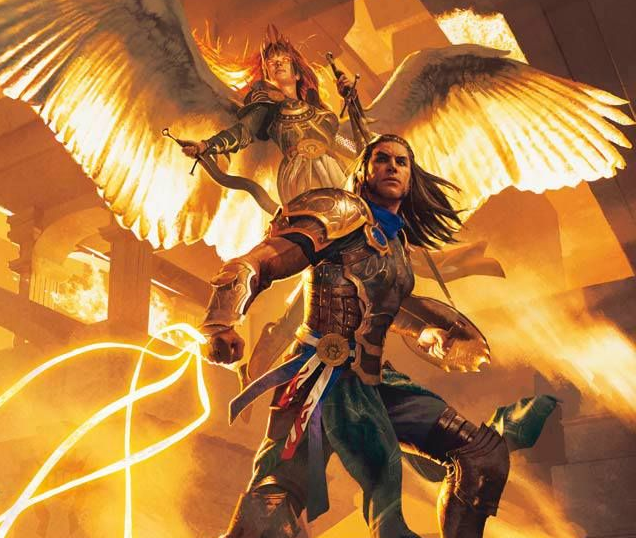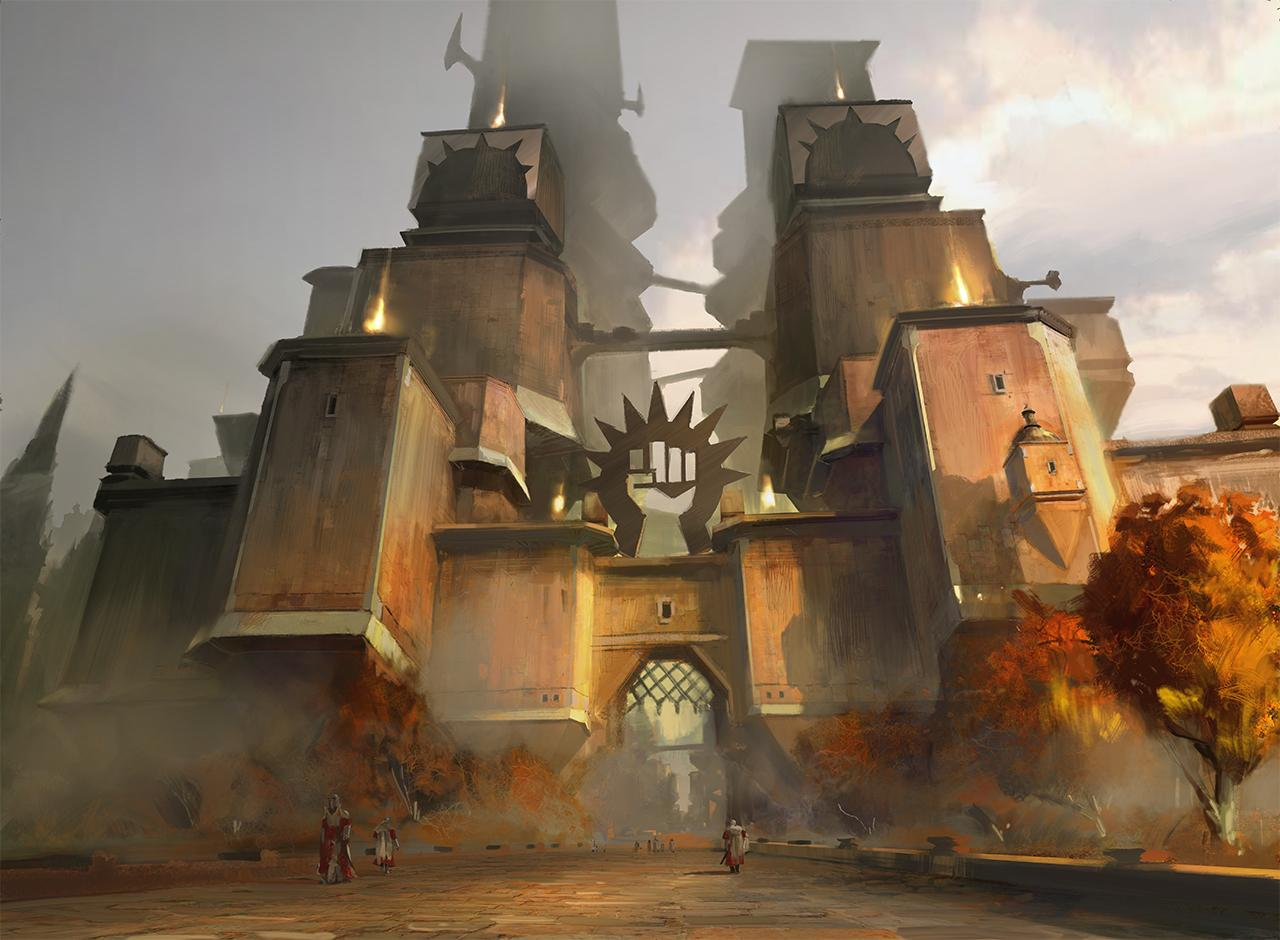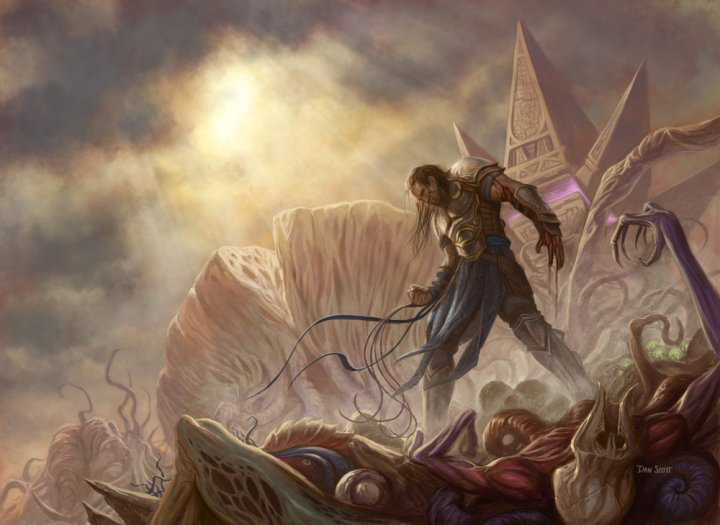We left the newly-christened Gideon Jura after he planeswalked to Bant to start his life anew. From there, we will lose track of him.
We know he stayed on Bant for some amount of time and then left for parts unknown. Eventually, he would cross paths with Chandra Nalaar, and enjoy a complicated, combative, and at times heartfelt adventure with her. This portion of his life is covered in the novel The Purifying Fire, which has been retconned to an extent that we’re not sure how much is canon. What we do know is that Chandra and Gideon part on bad terms, and he tries to seek her out to apologize. Guessing that she might be on Zendikar, he arrives in time to witness the birth of the Eldrazi. He assists in the defence of Fort Keff; but when he sees Emrakul, the Aeons Torn warping the horizon, he knows this is a threat bigger than any one man.
This probably seems like an unremarkable sequence of events, since we’ve known Gideon for so long. Yet a moment of reflection reveals how extraordinary is his response. Gideon has nothing tying him to Zendikar. Nothing. He doesn’t know anyone, want anything, or have any history there. To my knowledge, this is the first time he’s ever planeswalked to Zendikar, and he’s been on the plane for three days. This isn’t his fight or his problem. Any other planeswalker would have taken one look at the ravening Eldrazi dissolving the walls and nope’d out of Zendikar as fast as the Blind Eternities could part. That is the sensible, logical, selfish thing to do;it never even occurs to Gideon Jura. He leaps into danger at Fort Keff with the same decisiveness that saved the gates of Akros, and does not stop fighting until the danger is passed. Even when he realizes the scale of the threat, he leaves to find help instead of abandoning Zendikar to its fate. Whether or not Gideon knows them, the Zendikari need his strength and his skills; for that reason alone he will not forsake them.
Among Gideon’s many admirable and noble qualities, the best is his sense of duty. Gideon cannot turn away from people who need help, and he cannot ignore other people’s suffering just because it doesn’t affect him. It’s not in his DNA, and we never see him try. A part of that urge is good, and heroic, and righteous, and has been with him since the very beginning. But another part is recent, neurotic, and deeply unhealthy, born of shock and traumatic loss. On Zendikar, we see the best side of this gallant impulse; but on Ravnica, we see it become something pernicious and self-destructive.

Ravnica, the City of Guilds, the most populated plane in the Multiverse! A plane riven with conflict, in a perpetual state of ten-way civil war. The Gateless, those without a guild to defend them, are largely on their own; they live as quietly as they can, dodging the shadows of giants. Gideon comes to Ravnica to find a way to save Zendikar; but while there, his heart goes out to the suffering Gateless, and he quickly gets sidetracked trying to help them.
This makes no logical sense. Zendikar is dying. Seriously, tens of thousands of people are being slaughtered every day, and the Eldrazi are turning the very ground into ash and chalky dust. Yes, the Gateless of Ravnica have it pretty rough, but it’s always been that way. It’s not great, but it’s also not unusual. Zendikar is going through an extinction event, and any rational person would tackle the omnicidal Eldrazi before focusing on Rakdos carnivals and Gruul riots.
But Gideon’s concern for others is not rational. After the death of his Irregulars, Gideon internalized the idea that whenever anyone around him gets hurt, it was his fault. He blames himself for all the hardship and injustice he sees and feels compelled to stop it, no matter the cost to himself or the people he’s trying to help. The same drive that instantly made him an ally of Zendikar prevents him from prioritizing the Zendikari over the Ravnicans. It’s a compulsion, a deep-seated emotional need to make other people’s pain go away. In the scramble to slay the monster and rescue the innocents, Gideon tends to lose sight of the big picture.
Take his choice of allies: Gideon has no allegiance to the guilds, but knows he needs guild support to make anything happen. Had Gideon been thinking clearly, the Azorius and the Selesnyans might have been at the top of his list. While on Bant, Gideon would have seen lawyers draft statutes and raise institutions that promote the welfare of the whole community. He would have walked through peaceful meadows and seen people selflessly work together for the common good. Those two guilds, with their structure and numbers, are best poised to grant the Gateless rights and give them options to push back against guild encroachment. That’s what a Mono-White character would do. But Gideon doesn’t have time for that; he has to make things better now, yesterday, before anyone else gets hurt!
Is it any surprise, then, that Gideon’s footsteps lead him to Sunhome, the fortress of the Boros Legion? Apparently, he’s decided the best way to aid the Gateless is by kicking ass and taking names. The problem with severing your Red side is that it doesn’t get rid of your emotions—it just removes your awareness of them. I don’t think Gideon realized to what extent his actions were driven by his savior complex, rather than genuine concern. And though I love the Boros, I do have to wonder: how much of his alliance with them was pragmatic, and how much was about being reminded of happier times?
Aurelia motioned for Gideon to accompany her across the polished marble floor of the great war room to a high balcony that looked over the central grounds of Sunhome. The air smelled fresh and clean. Gideon’s eyes adjusted to the bright sunlight. Far below, legions of Boros knights trained and marched in the gleaming sun, while flags and banners moved in the breeze. It was a glorious sight.

At first, things go well. Guildmaster Aurelia lends Gideon a battalion to clear out the Ninth District. He lures the Rakdos and Gruul to a central plaza and lets them tear each other to pieces, then moves in with the Boros to mop up the survivors. Gideon saves hundreds of lives, brings peace to a war zone, and makes valuable contacts with one of the Ravnican guilds: not a bad day’s work. But there are always more people to save, and Gideon quickly gets bogged down in every crisis on the plane.
Limits
There are two short stories that are crucial to understanding Gideon Jura, and the first is Limits. This is Gideon at his absolute lowest, as we see him slowly descend into utter neurosis. The story tells of Gideon battling the Eldrazi on Zendikar during the day and trying to manage a goblin gang-war on Ravnica at night. Days and days of battle without sleep or meals, as his exhaustion grows and his injuries pile up. The whole time, the amount of people he feels responsible for increases exponentially. At first, it was the entire plane of Zendikar. Then, he adds the poor Gateless of the Ninth District. After that, he seems to have adopted all the Gateless on Ravnica:
As long as the fighting continued, the unguilded population—the gateless—was in danger.
Unacceptable.
Acting on his own initiative, Gideon kidnaps the crime lord Krenko in broad daylight (getting stabbed twice for his trouble) and drags him to a Boros garrison. Then, the goblin’s enemies threaten to burn down the garrison to get to Krenko, so Gideon sets out alone again to protect the weak, helpless Boros legionnaires. Gideon kicks in the door of a goblin arsonist’s basement, bleeding from multiple open wounds and on the verge of total collapse. He knows the goblin has hostages and accidentally sets the room on fire while trying to disarm him. The hostages are trapped behind a heavy bookcase, and in his weakened state, he can’t get it to budge:
Gideon left Rikkig in a heap, and raced to the bookcase. He put his shoulder against it and pushed. Sweat collected at the end of his nose and chin, and every muscle begged for rest, but the heavy bookcase refused to yield even an inch. Gideon shut his eyes to the smoke that filled the room, and he struggled to gulp the necessary breath to continue.
His strength had begun to fail when, suddenly, the bookcase yielded and lurched forward. His eyes flew open, and Gideon saw Dars and another Boros legionnaire lending their strength to his efforts. Together, they pushed until the bookcase slid aside to reveal a narrow, round passage.
Gideon slumped against the bookcase in a fit of coughing. “Prisoners,” he managed, and Boros soldiers filed past him into the passage.
Thankfully, the Boros are neither weak nor helpless. Seeing the state Gideon was in, they set a tail on him, knowing he would need backup. But Gideon isn’t very appreciative:
He shifted his gaze to Dars. “You followed me.”
“Clearly I had reason. You didn’t have to do this alone, Gideon. We fight as a legion because some things are bigger than us.”
“I had him, Dars.”
“We’ll find him. As a legion, we’ll find him. You have a rest.”
Not yet.
We never once see him fight alongside someone else in this story, Zendikari or Ravnican, nor ask anyone for their help. He’s trying to one-man-army his way through every problem, and to his credit, the lunatic keeps it up for an entire week. But everyone, even Gideon Jura, has limits. After this incident, he will immediately planeswalk to Zendikar and spend the whole day fighting at the Fall of Sea Gate. Upon meeting a leyline expert who has found a breakthrough, he planeswalks to Ravnica to find the Living Guildpact, Jace Beleren. Instead, he will collapse in the middle of the street, his body finally giving out after days of unrelenting punishment.

So what the heck’s happening here? Remember, my thesis is that Gideon is a Red/White individual that intentionally suppressed his Red side after losing his Irregulars. But to fully understand his state of mind, we’ll need to go a little deeper into Color Pie theory.
White and Red are enemies, but they have a few things in common. One of which is a certain social bent, an awareness that life is meant to be lived together. White is about uniting people ideologically around a single purpose, principle, or belief. Red is about connecting people emotionally through shared experiences and feelings, both positive and negative. Red/White, then, is about people uniting emotionally around a shared belief. That’s exactly how the Boros Legion operates and how Kytheon brought his Irregulars together to defend Akros. But the Irregulars are gone, and Gideon is terrified to form these Red emotional connections again in case they, too, die for his mistakes.
Think about it: Gideon is fighting for the Gateless and the Zendikari, but do we ever see him actually talk to one? The only Gateless he interacts with are the goblins, and his communication with the Zendikari mostly boils down to “Go! I’ll hold them off!” He’s fighting (sincerely and whole-heartedly) for the idea of these innocents, while trying not to actually get that close to them. Munda and Dars try and reach out, but he brushes their concerns and assistance aside. His rejection of Red’s emotional vulnerability is so extreme, it also causes him to reject White’s neighboring belief in the weak working together to overcome the strong.
Another thing White believes in? Sacrifice, and not just the personal kind. White is totally down to sacrifice some to save the rest. If the Gateless on Ravnica must die to save Zendikar, welp, that’s just the needs of the many. White is absolutely willing to make that call, but Gideon can’t. Why? He wasn’t able to push his Red side down deep enough. He saw the Gateless, looked on their suffering and felt empathy for them. He cannot coldly dismiss their pain as less than the Zendikari’s, even if it factually is, because of that emotional bond. He cares about them equally, and cannot distinguish Ravnica’s needs in his mind from Zendikar’s.
By denying a part of himself, Gideon has become a paralyzed mess, unwilling to work with others but unable to disregard them. He relies on White and Red’s weaknesses (self-neglect and recklessness) while refusing their strengths (cooperation and charisma). This psychosis brings Gideon to death’s door, and would have surely killed him if he hadn’t run into Jace, Chandra, and Nissa first.
Tune in next week to see how the Gatewatch becomes a new family for Gideon, and returns to him something he thought lost forever.
David Walley is only a recent fan of Magic: The Gathering, but a lifelong spectator to stories. After discovering the Magic Story earlier this year, he was greatly impressed by both its strength and subtlety. In his articles, he endeavors to expand the Vorthos community by showcasing the story’s excellence to the average Magic fan.

